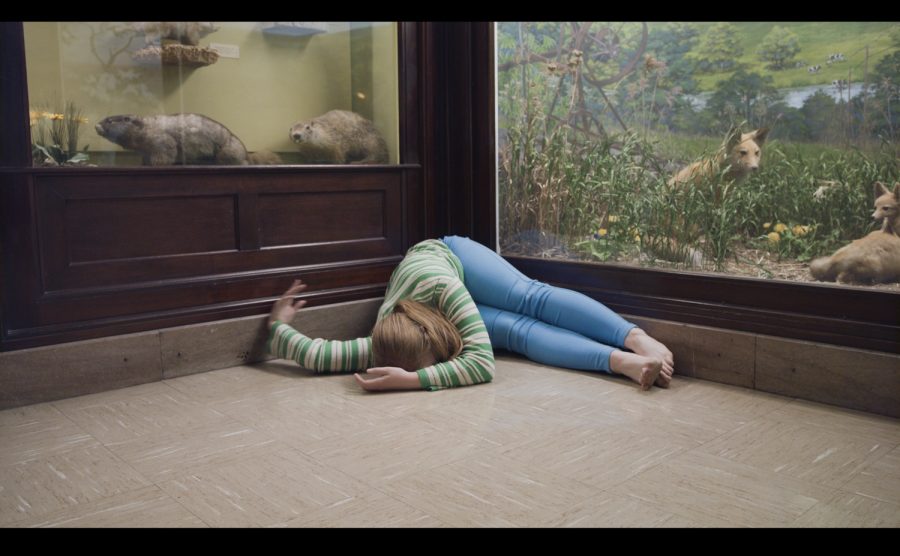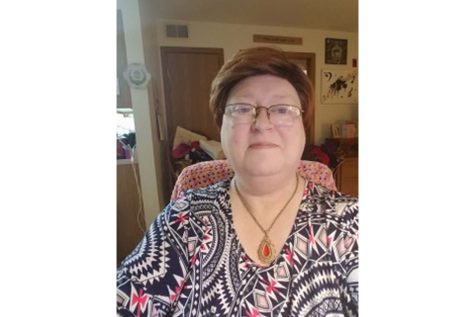UI creatives make short film inspired by Museum of Natural History’s Mammal Hall
The 17-minute short film explores how people interact with museums, and features several University of Iowa student performers.
January 20, 2022
The University of Iowa Museum of Natural History in MacBride Hall has become the scene of a recent short film: Mammal Hall, which combines dance and sound into a visual and cinematic experience for the viewer.
This 16-minute film displays the interaction viewers have with the Museum of Natural History through a body-focused dance movement piece.
Film creator and UI visiting professor, Stephanie Miracle, said she was inspired by the museum space after encountering it when she first moved to Iowa City for a position in the UI’s dance department.
“As a choreographer, I’m often very inspired by the location and its meaning,” Miracle said.
Ramin Roshandel, the film’s composer, hopes the film encourages viewers to be curious about the museum.
“I would like this project to raise some questions for people, to encourage them to think about the concept of museums so we’re preserving these kinds of species and philosophy behind it,” Roshandel said.
Mammal Hall has been in the works as a project since before the COVID-19 pandemic, and its creators originally intended it to be a live performance. It was then reimagined as an audio play podcast, and in January 2021, the project was finally changed to become a cinematic piece.
While the pandemic closed businesses and canceled events, it allowed this project to blossom over the course of two years, said the film’s cinematographer, Auden Lincoln-Vogel.
“The reason we were able to go there every Friday and have the museum to ourselves and shoot was because the museum was closed because of the pandemic. So in a weird way, it sort of made it possible,” Lincoln-Vogel said.
Miracle noted that masks were worn during the process of making the film, which impacted its visuals.
“[The masks] specifically led us to making choices to avoid showing the face of the dancer which worked conceptually well for us,” Miracle said. “We see the faces of the animals really up close, and they’re highly characterized by the human face but you will see little glimpses of masks here and there.”
Mammal Hall is ultimately a film about connecting to the museum, and the animals within it — including humans. The film’s title originates from its setting, but also the fact that humans are mammals as well. This abstract quality of the film entices the viewers to interact with more than just words — the senses are stimulated when viewing, as the different sounds and textures change.
Sound is used as a tool throughout the film. As the dancers move through the halls of the museum, audio recordings from the exhibits play — sometimes clear and distinct, while at other moments muffled and distant.
Piano melodies also sneak in and out of the film, bringing a serene sense of calm and wonder. White noise drips through the scenes as the dancers move around the mammals, enabling the viewer to be taken on a cinematic journey through the museum in a completely unique way.
Dancers for this film included a mix of graduate and undergraduate students at the UI.
The creators of Mammal Hall hope to have an online version for viewers sometime in the future. They also plan to create an audio-described version for those who are blind or have low vision.
Miracle said the film is about different forms of curiosity and bringing audiences to attention. Mammal Hall uses the dancers to draw attention to different parts of the screen, moving them from the main focus to pulling them into the background, barely noticeable to the viewer.
“I really enjoyed being in the museum but using it in a completely, what would otherwise be a very inappropriate way, just seeing people swarming around on the floor and filming that, and just sort of using the space in a way that’s probably never been used or probably will ever be used again,” Lincoln-Vogel said.
















